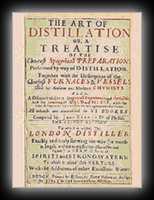
The Art of Distillation
by John French
1651
If what I know may add to your experience, you may have it freely. And if I shall see that this treatise of distillation passes with acceptance among the artists of this nation, I shall hereafter gratify them for their good will with two other parts of chemistry, viz. sublimation and calcination. And I hope this will be occasion to set the more expert artist on work, for the communicating their experiences to the world. One thing (courteous reader) let me desire you to take notice of, viz. whereas every process is set down plain, yet all of them must be proceeded in secundum artem alchymistae (which art indeed is obtained by experience) and therefore many that work according to the bare process effect not what they intend, and the reason is this, because there was some art of the alchemist wanting. To conclude, if you know more or better things than these, be candid and impart them (considering that I wrote these for them that know them not); if not, accept the endeavors of your friend, John French.
a selection from the PREFACE:
There is a glut of chemical books, but a scarcity of chemical truths. Nature and art afford a variety of spagyrical preparations, but they are as yet partially undiscovered, partially dispersed in many books, and those of diverse languages, and partially reserved in private men's hands. When therefore I considered what need there is of, and how acceptable a general treatise on distillation might be, especially to our English nation (and the rather since Baker upon distillations is by reason of the description of a few furnaces and vessels therein, besides which there is small variety either of preparations or curiosities sold at such a high rate) I thought I could do them no better service than to present them with such a treatise of that subject which should contain in it the choicest preparations of the most select authors, both ancient and modern, and those of several languages, and which I have attained by my own long and manual experience, together with such as I have by way of exchange purchased out of the hands of private men which they had monopolized as great secrets.
But on the other hand, when I considered what a multitude of artists there is in this nation, from many of which more and better things might be expected than from myself, I was at a nonplus in my resolutions, fearing it might be accounted an unpardonable presumption in me to undertake that which might be better performed by others. But for the avoiding of this aspersion, be pleased to understand that I present not this to the world under any other notion than of a rough draft (which indeed is the work of the more unskillful and, therefore, of myself without exception) to be polished by the more expert artist.
I rejoice as at the break of day after a long and tedious night to see how this solary art of alchemy begins to shine forth out of the clouds of reproach which it has for a long time undeservedly laid under. There are two things which have eclipsed it for a long time, viz., the mists of ignorance and the specious lunary body of deceit.
Arise, O Sun of truth, and dispel these interposed fogs, that the Queen of arts may triumph in splendor! If men did believe what the art could effect, and what variety there is in it, they would be no longer straightened by, nor bound up to or lurare in verba Galeni, vel Aristotelis, but would now subscribe a new engagement to be true and faithful to the principles of Hermes and Paracelsus, as they stand established without Aristotle, their prince, and Galen and Hippocrates, their lords and masters. They would no longer stand dreaming forth, Sic dicit Galenus, but Ipse dixit Hermes. I desire not to be mistaken as if I did deny Galen his due, or Hippocrates what is his right for, indeed, they wrote excellently in many things, and deserve well thereby. That which I cannot allow of in them is their strict observation of the quadruplicity of humours (which in the school of Paracelsus and writings of Helmont, where the anatomy of humours has been most rationally and fully discussed, has been sufficiently confuted) and their confining themselves to such crude medicines which are more fit to be put into spagyrical vessels for a further digestion than into men's bodies to be fermented therein.
